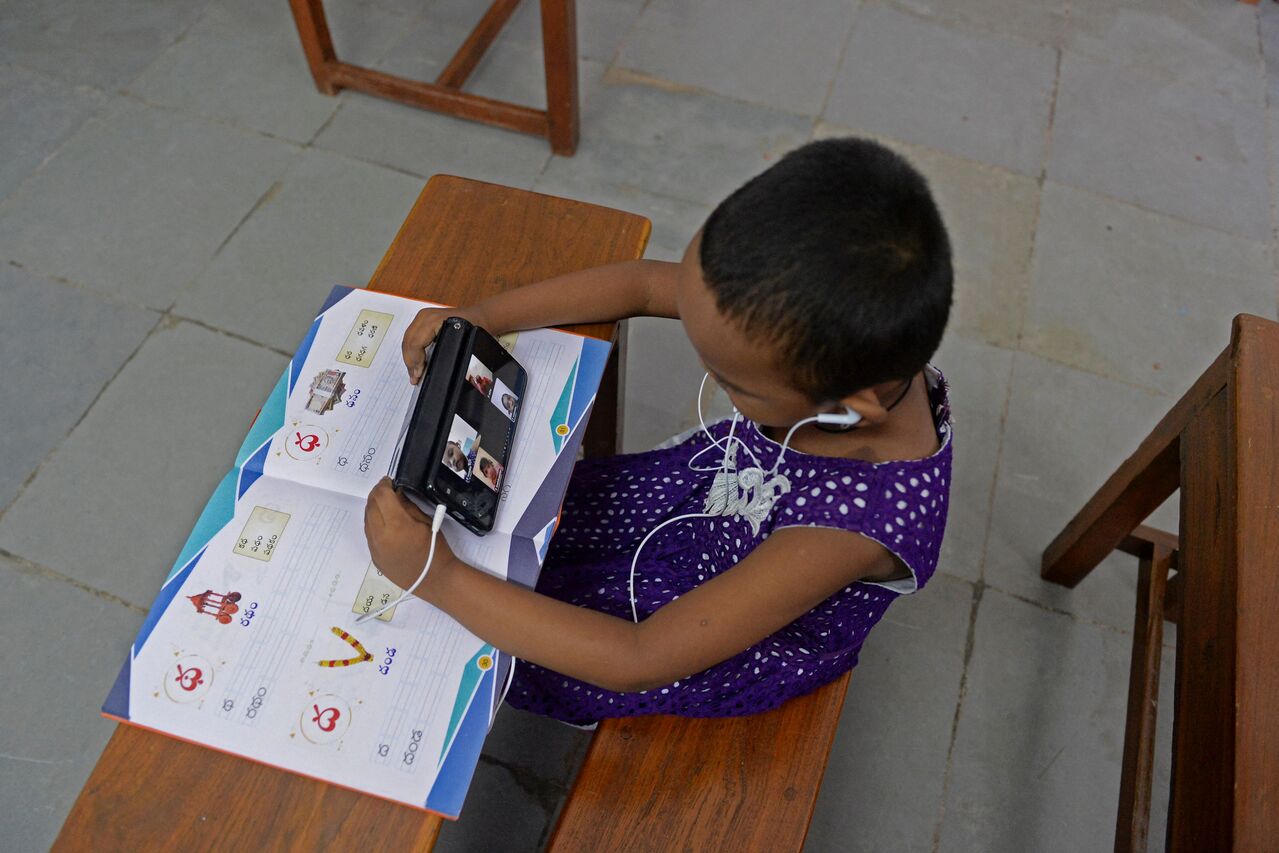India's online schooling has narrow reach, crippling impact on kids' education: Report
Sign up now: Get insights on Asia's fast-moving developments

The prolonged closure of Indian schools has impacted children's reading abilities, said the report released on Sept 6, 2021.
PHOTO: AFP
Follow topic:
NEW DELHI - A new report has revealed the narrow reach of online schooling in India and the crippling impact this has had on children's education across the country during the Covid-19 pandemic.
Only 8 per cent of the children surveyed for the report in rural parts of the country are studying online regularly and as many as 37 per cent are not studying at all, according to Locked Out, an "emergency report" on school education released on Monday (Sept 6).
In urban India, the figure is better, but marginally so, with 24 per cent found to be studying online regularly and 19 per cent not studying at all.
The survey was carried out last month and factored in responses from nearly 1,400 children and their parents spread across 15 states and union territories.
Primary and upper-primary schools in India have been shut for 17 months, depriving children of their right to education, as well as nutrition and a healthy social life. Many poor Indian families depend on mid-day meals provided at government schools for their children's nutrition.
The prolonged closure of schools has also impacted children's reading abilities, according to the report. More than 75 per cent of parents said they felt that their child's reading abilities had declined during the lockout and over 90 per cent of them said schools should reopen.
"The fig leaf of online education masked the elephant of school exclusion for the best of 17 months. The fact that this monumental injustice remained virtually unquestioned for so long is a telling indictment of India's exclusive democracy," said the report.
Covid-19 has relatively been under control in India since the calamitous second wave in May with around 40,000 cases being reported daily at the moment.
Since the start of this month, certain states have begun reopening schools, not just for senior grades, but also those between grades six and eight.
While the risk of children contracting Covid-19 at school has been cited as the reason for keeping them shut, the loss of learning seems to be a bigger concern for the survey's respondents. Fewer than 10 per cent of the respondents were concerned about or opposed to reopening schools.
"Many of the rest looked at us with disbelief when we asked whether they felt schools should reopen. They could not understand why schools should remain shut when literally everything else is open - banks, public transport, malls and cinemas in metros and so on," Dr Reetika Khera, an associate professor of economics at the Indian Institute of Technology Delhi, told The Straits Times.
She is part of the coordination team that put together the report, relying on results gathered by nearly 100 volunteers.
"Moreover, please bear in mind that the adults in the homes of these children have to go out to earn money each day and children living in congested urban settlements mill about their neighbourhoods - so the disease risk is there even when schools are shut," said Dr Khera.
The fallout has been more severe on marginalised groups such as Dalit and tribal households. Only 4 per cent of rural Scheduled Caste (SC) and Scheduled Tribe (ST) children, for instance, are studying online regularly, compared with 15 per cent among other rural children.
Dalits, or SCs, account for 16.6 per cent of the country's population and those categorised as Scheduled Tribes, comprising disadvantaged tribal groups, make up another 8.6 per cent. About 60 per cent of the sample households are from rural areas and belong to these marginalised communities.
A key reason why children in India have been unable to participate in online schooling is the lack of access to a smartphone. About half of the sample households surveyed in the rural areas had no smartphones.
Even among households with a smartphone, the proportion of children who are studying online regularly is just 31 per cent in urban areas and 15 per cent in rural India.
This is because working adults end up with the family's only smartphone; only 9 per cent of all the children surveyed had their own smartphone. Poor Internet connectivity, as well as lack of money to purchase data packs, has also hindered online schooling.
The Locked Out report corroborates findings from other surveys in India that have highlighted a widespread lack of access to online education and worrying levels of learning loss among children.
It also found there was scant offline education support for children, such as through informal neighbourhood schooling that was introduced in parts of the country by the government and non-governmental organisations.
The team behind the report hope it will lead to greater awareness about the catastrophic consequences of the lockout and contribute meaningfully to ongoing discussions on how to reopen schools safely.
"I think there is consensus that even a few hours a week of in-person contact with the teacher can help students immensely," added Dr Khera.
She also offered other suggestions, including priority vaccination for teachers that was recommended in a report by the Indian Association of Preventive and Social Medicine on Sunday.
Reopening schools is only one part of the challenge though. Despite the widespread decline in their reading and writing abilities, children are being promoted to higher grades with new textbooks that are "way out of gear" with their current learning levels.
"Dealing with this massive disconnect requires major changes in curriculum and pedagogy over an extended transition period - years rather than months," the report warned.

